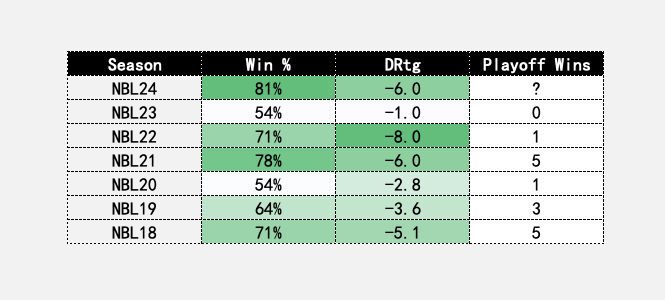Defence, values, accountability: How Dean Vickerman and Melbourne United created a perennial contender
Now on a chase for their third NBL title in seven years, United has risen and built its culture under Vickerman's charge.
Credit: Daniel Bennett Photography
Tune into a TV broadcast, consume any audio or written content on the league, or listen to a new coaching hire, and you’ll hear ad nauseam that defence is the key to success in the NBL. For Melbourne United fans, they’ve lived that idea in recent campaigns, currently on track to finish the regular season with the best defence for a fourth time in seven years. Having never rated below average in defensive efficiency in Dean Vickerman’s tenure, United have used that strength to power themselves to a winning record in each season he’s been in charge, including two titles and now, favourites for a third.
“We’ve spent so much time with this group working out the identity of the team that we wanted to create, and the values that were most important to us,” Vickerman explained to me after a Tuesday practice session.
Even with a 13-3 record this season, those values have still been tested at times, with the team showing the required resilience and championship level habits when challenged. On 12 November, it was a statement ‘Throwdown’ win, when three of United’s top six players were absent and others were required to contribute more.
It drew a noticeably proud reaction from the head coach.
“The challenge for me to the group was, regardless of who’s playing for us, can you keep the identity of the club,” Vickerman said. “Can these guys who’ve been with us for a short period of time play defence the way we want to and just live our trademark? I think that was a massive reward for everybody at the club to say we can slot people in [and they can cover those we have out].”
In early December, United conceded an out of character 115 points to the Cairns Taipans, prompting the coaching staff to look at themselves, as well as challenging the playing group. “We were all the things that we didn’t want to be, and for us as a coaching staff, we really put it back on us to say there’s been slippage,” Vickerman explained. “We saw it in the first half of the Kings game [the week prior]. We possibly celebrated the comeback and the things that we did well more than seeing the red flags of what happened in the first half, because it reappeared. I think any time as a coaching staff that you see repeat [subpar] performances, it’s on us more than anything to make sure that we don’t allow it and pull it up.”
The follow up test was passed, with Melbourne locking down the Brisbane Bullets in the following game, holding them to 68 points in 40 minutes after giving up 67 in the first half against the Taipans. It was relentless right until the buzzer with the final two minutes of the game featuring an almost all-bench unit on the floor, madly scrambling around to hold the Bullets scoreless in that time. It was the level of defence that had catapulted them to the top of the standings to begin the season.
“We saw a change in behaviour [after challenging the group],” Vickerman said. “We saw an edge back in practice and people really go at each other, and just a want to not let that happen again.”

Before Vickerman’s appointment in 2017, Melbourne United (and Tigers prior to the rebrand) had been mired in mediocrity, failing to win a playoff game in the eight previous years, not even qualifying for the postseason in six of those.



